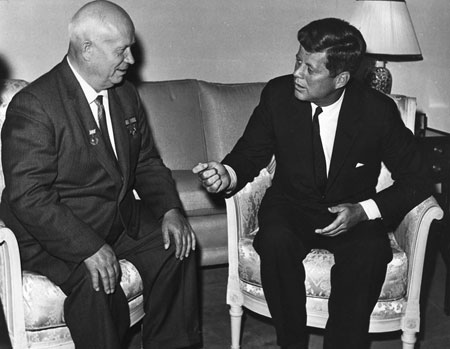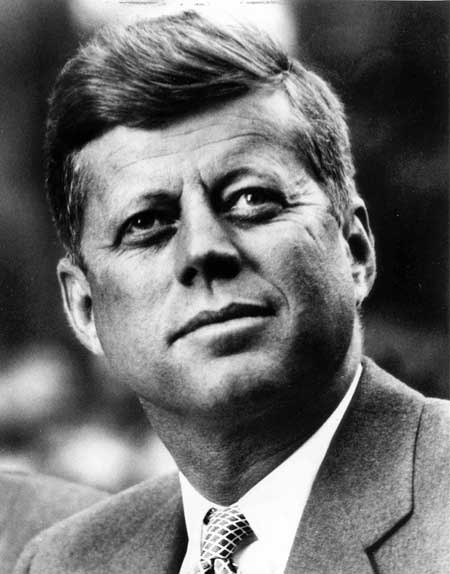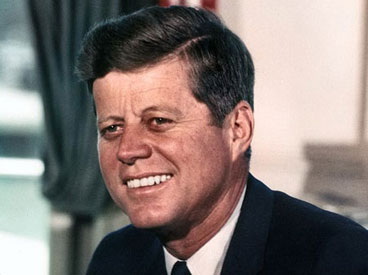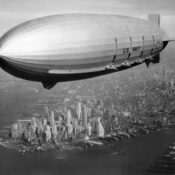Why do Americans have such a high opinion of John F. Kennedy? The 35th president completed only three years of his term and left behind a pile of unfinished projects and unraveling plans when he died. So why, in opinion polls over the decades, have Americans consistently ranked Kennedy among our greatest presidents?
At the time of his death, his grand design for a united Europe had recently collapsed. In Southeast Asia, the South Vietnamese president he had been supporting with money and troops had just been overthrown and assassinated. And Americans in 1963 could not have forgotten the failed invasion of Cuba by anti-Castro refugees, which had been launched with Kennedy’s approval.
And then, there were Kennedy’s problems at home. “On the day of his death,” wrote Stewart Alsop (“Was John F. Kennedy A Great Man?” Dec. 3, 1966), “all four of his major legislative objectives–aid to education, the civil-rights bill, Medicare, the tax cut—were hopelessly stalled in Congress.”
But consigning Kennedy’s bills to the ‘defeat’ pile, Alsop argued, would be short-sighted: “The four legislative objectives which were so hopelessly stalled in Congress when he died…are all the law of the land now.” They were passed through the efforts of President Johnson and backed by a wave of public support for the late president’s programs. Without Kennedy’s initiative, these laws might never have been introduced or passed.

Americans of 1963 would have regarded Kennedy’s handling of the Cuban Missile Crisis as one of his successes. He had demanded that Russia remove the missile bases it had built in Cuba, and threatened the use of force if they refused. At the time, Kennedy was criticized for risking a nuclear war. But he proved himself to be a tough and tactful negotiator, and by establishing some limited rapport with Soviet premier Khrushchev, Kennedy was able to restart talks to halt the nuclear arms race.
In 1962, the two leaders signed the first test-ban treaty, which bound both nations to stop testing nuclear weapons in the atmosphere. The treaty reduced radioactive fallout in the earth’s atmosphere and slowed the development of bigger bombs. Kennedy was particularly proud of the treaty, which he considered a first step toward nuclear disarmament.
Americans today are more likely to give Kennedy credit for advancing the nation’s space program. After the Russians launched the first satellite (1957) and the first man into space (1961), Kennedy asked Congress to fund a multi-billion-dollar space program. Its goal would be “landing a man on the moon and returning him safely to the earth” before the end of the decade. It seemed like an utterly fantastic idea in 1961, but Kennedy’s goal was reached in 1969, with six months to spare.
Kennedy is also given high marks for the Peace Corps, which he launched shortly after entering office. Within a few months, thousands of Americans had volunteer to share their time and technical expertise. In the half century since then, the program has sponsored over 200,000 Americans who have helped improve the quality of life in over 130 countries.
But are the Peace Corps, the space program, and a distant crisis enough to earn Kennedy continued high regard? Perhaps what makes Kennedy admirable today is not what he accomplished but how he inspired. When Joseph Alsop wrote of how Kennedy would be remembered, (“The Legacy of John F. Kennedy,” Nov. 21, 1964), he emphasized how the president, by the example of is character, had introduced a time of “renovation and renewal” for the country.
Of course, Stewart and Joseph Alsop were writing about Kennedy in the days before his many adulterous affairs and his precarious health became public knowledge. These later revelations did much to tarnish Kennedy’s character and caused Americans to reconsider the late president’s judgment and achievements. But with the 50th anniversary of his death, many writers are taking a broader view of Kennedy’s performance as chief executive and distinguishing between his public service and his private life.

In the 1960s, Joseph Alsop had been impressed by Kennedy’s style and outlook, which had so little in common with the “average, day-to-day America in the mid-’60s. No one could have differed more sharply from the good, average American, who watches television in his off-hours, is content if his is a two-car family, and does not mind bulging a bit in middle age.”
America had lost its edge during the complacent 1950s, Alsop believed. “Our wealth and our machines have made us, as a nation, just a bit soft and fat, and most of us do not mind this in the least. But Kennedy minded…[He]…was decidedly repelled by softness and flabbiness.”
Throughout Alsop’s article, you can hear the dissatisfaction and search for a better life that was the spirit the 1960s. It’s the same spirit that Post reporter Beverly Smith described in “The Prospects of Candidate Kennedy” (Jan 23, 1960)—the “troubled feeling that we have failed to live up to the greatness of our heritage.”
Americans, Alsop believed, identified with Kennedy’s focus, energy, and passion for achievement. “The routine, the ordinary, the merely average displeased and bored him,” wrote Alsop. “He wanted to live…meaningfully, to the utmost limit of his powers.”
Kennedy told Americans that a better life, and a better world, was possible, but it would take conviction, hard work, and a courage that, Alsop wrote, was “exceedingly uncommon” in modern America. “For Kennedy, courage, whether physical or moral, was the first and most essential of the virtues.”
Americans elected Kennedy because he showed the intensity, idealism, and courage they wanted in their lives. They were hungry for a sense of achievement after years of caution, stagnation, and continual fear of devastating attacks on the U.S. In this regard, they were not so different from us, which is why the example and the memory of Kennedy still matter.
Become a Saturday Evening Post member and enjoy unlimited access. Subscribe now



